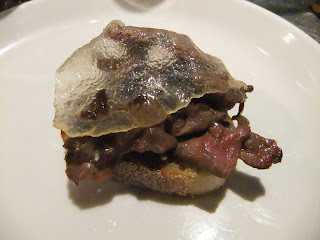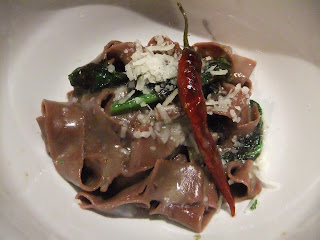I first sampled the cuisine of Chef Ed Kenney shortly
after he opened his first restaurant, Town in the heart of Kaimuki about 12
years ago. It was a wine dinner for about a dozen or so diners where Chef
Kenney graciously allowed us to bring our own bottles of wine. It was at Town
where I first sampled a mixed platter of unique frites or batter coated fried
items but unlike the usual calamari, his frite platter included fried long
beans, thinly sliced cauliflower and thinly sliced lemon including the peel. The
acidity from the lemon along with slight bitterness from the pith cut through
the fried batter and refreshed my palate between bites and left a lasting
impression in my food memories. Fast forward to October 5th where we
once again sampled the unique, local cuisine of Chef Kenney at the annual Good
Table fundraiser for the Lanakila Meals on Wheels program.
Chef Ed Kenney
If you frequented Waikiki in the 1960’s and 1970’s, you
may have seen Chef Kenney’s parents – Ed Kenney Jr and Beverly Noa - performing
at either the Royal Hawaiian or Halekulani hotels. Thankfully, Chef Kenney took
a different path into the culinary world starting with formal training locally
at the Culinary Institute of the Pacific culminating with the opening of Town
in 2005 then the Kaimuki Superette in 2014, Mud Hen Water in 2015 and Mahina
& Suns just last year. And if you are a regular viewer of PBS, you’ll
notice that Chef Kenney is starting his second season as the host of Family
Ingredients highlighting food cultures in various countries.
Well after Alan Wong and Roy Yamaguchi made Regional
Hawaii Cuisine a buzzword but well before the latest generation of local chefs
like Andrew Le, Chris Kajioka and Mark Noguchi made a mark on the 50th’s
culinary scene, Chef Kenney quietly stamped his own identity starting with
Town. His mantra of “Local first, organic whenever possible, with Aloha always”
placed an emphasis not just on purchasing local products whether it was Mao
Farms produce, Pono Pork or Kualoa Ranch oysters but also highlighting
traditional foods not usually seen on restaurant menus like pa’i’ai (freshly
pounded taro root) or ulu (breadfruit). He’s also the only chef in the 50th
who follows the Monterey Aquarium’s Seafood Watch Program recommendations which
places an emphasis on sustainable and safe seafood and it doesn’t hurt that
he’s one of only a handful of chefs who cures their own charcuterie.
Town
Though I thoroughly enjoy the “on the menu” items at
Town, one of my most memorable meals was a Whole Hog dinner that Chef Kenney
created as a fundraiser auction item for the local culinary programs. It
consisted of traditional pork dishes like sausages and pork belly but also
included panko coated and fried trotter (pork feet) cakes, pasta made with
pork’s blood and grilled pork heart and lardo (cured pork back fat) crostini
and dinner concluded with a whole roasted pig head that diners shredded for pig
head tacos – a luscious blend of crispy skin and succulent, gelatinous meat!
Though that dinner was some 6 years ago, I can still literally close my eyes
and smell and taste every single dish.
Then 2 years ago, I attended another special dinner once
again created by Chef Kenney using products considered invasive pests in
Hawaii. This Invasive Species Dinner featured gorilla ogo – a fatter, faster
growing ogo that tends to overwhelm any other seaweed but is just as delicious
as thinner ogo used for poke and namasu, wild boar – no explanation needed as
I’m sure you’ve already seen these hairy, black ruffians on the side of the
road which contribute to avian malaria, ta’ape or blueline snapper which
inhabits all of Hawaii’s reefs and mangrove wood. No we didn’t consume the wood
but Chef Kinney used slices of mangrove as a base to cook opah (moonfish) the
way cedar planks are traditionally used to cook salmon.
Mud Hen Water
Mud Hen Water (MHW) is the literal translation of the
street fronting the restaurant. Waialae breaks down to “wai” or fresh water and
“alae” or the endangered mud hen which supposedly populated the area before the
development of Kaimuki. It sits “kitty corner” to Town (and the Kaimuki
Superette sits right next to Mud Hen Water) giving Chef Kenney three
restaurants within a one block area. The vibe at Mud Hen Water is a little more
casual (though Town isn’t stuffy or formal by any stretch of the imagination)
though the menu seems to highlight more local products and new interpretations
of ethnic classics like Pig Face and Kim Chi Omelette, MHW’s take on the
classic Filipino sisig or chopped, fried and spiced pork head and belly, Yaki o
Pa’i’ai or their take on grilled mochi served with shoyu, sugar and nori using
freshly pounded taro in place of the mochi or Cold Ginger Rabbit Terrine or a twist
on the classic Chinese cold ginger chicken substituting locally raised rabbit.
And though I’m not a dessert person, I’ve already “borrowed” their
Miso-Butterscotch Rice Pudding creating my own chocolate natto rice pudding
with natto caramel sauce for the annual Natto Day dinners… Though I do give
Chef Kenney credit for the inspiration.
The Good Table
Menu
Amuse Bouche
radish, mint and
sesame
beet poke
yaki o ulu
The radish was single bite that perked the palate with
the pickled carrot contrasted by the toasted sesame seeds while the beet poke
with roasted beets, smoked macadamia nuts, ogo and sesame oil on mashed avocado
has been one of my faves since we first dined at MHW and the yaki o ulu simply
substituted grilled breadfruit for the grilled pa’i’ai on the usual menu.
Soup
Kauai shrimp canh
chua
Like a milder version of hot and sour soup, the broth was
rich but not salty with just enough heat to tickle the back of your throat
(versus hot and sour which burns the mouth). Since two fellow diners had
shellfish allergies, our server actually ran across the street for two bowls of
soup that was being served at Town so they didn’t miss the soup course.
grilled whole
opakapaka
I’m not sure what the opakapaka was seasoned with but
just the fish by itself had a very savory flavor – almost umami-like – that
went way beyond grilled fish. It’s almost like the opakapaka was marinated
because that savoriness was present in every bite.
Sides
Chinese 5 spice
carrots
pohole salad
buttered ulu
hapa rice
The burnt bread sauce served over the carrots was almost
like the traditional Sauce Romesco in Spain using old bread, toasted almonds
and rehydrated red peppers and would have been my favorite side dish but the
buttered breadfruit with black bean, sour orange and cilantro was hearty enough
to almost be a vegetarian main course.
And blanched fiddlehead ferns (pohole) are always good.
Dessert
Guava clafoutis
with coconut sorbetto
These clafoutis were almost pancake like, like Dutch
babies with flecks of guava which paired perfectly with its local fruit
partner, coconut.




















Comments